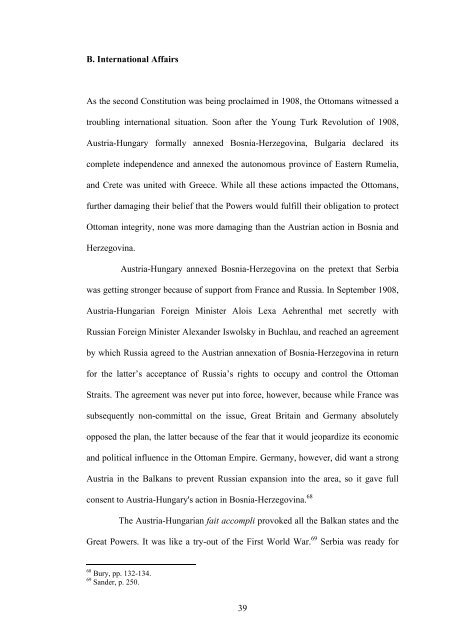the beginnings of ottoman-german partnership - Bilkent University
the beginnings of ottoman-german partnership - Bilkent University
the beginnings of ottoman-german partnership - Bilkent University
You also want an ePaper? Increase the reach of your titles
YUMPU automatically turns print PDFs into web optimized ePapers that Google loves.
B. International Affairs<br />
As <strong>the</strong> second Constitution was being proclaimed in 1908, <strong>the</strong> Ottomans witnessed a<br />
troubling international situation. Soon after <strong>the</strong> Young Turk Revolution <strong>of</strong> 1908,<br />
Austria-Hungary formally annexed Bosnia-Herzegovina, Bulgaria declared its<br />
complete independence and annexed <strong>the</strong> autonomous province <strong>of</strong> Eastern Rumelia,<br />
and Crete was united with Greece. While all <strong>the</strong>se actions impacted <strong>the</strong> Ottomans,<br />
fur<strong>the</strong>r damaging <strong>the</strong>ir belief that <strong>the</strong> Powers would fulfill <strong>the</strong>ir obligation to protect<br />
Ottoman integrity, none was more damaging than <strong>the</strong> Austrian action in Bosnia and<br />
Herzegovina.<br />
Austria-Hungary annexed Bosnia-Herzegovina on <strong>the</strong> pretext that Serbia<br />
was getting stronger because <strong>of</strong> support from France and Russia. In September 1908,<br />
Austria-Hungarian Foreign Minister Alois Lexa Aehrenthal met secretly with<br />
Russian Foreign Minister Alexander Iswolsky in Buchlau, and reached an agreement<br />
by which Russia agreed to <strong>the</strong> Austrian annexation <strong>of</strong> Bosnia-Herzegovina in return<br />
for <strong>the</strong> latter’s acceptance <strong>of</strong> Russia’s rights to occupy and control <strong>the</strong> Ottoman<br />
Straits. The agreement was never put into force, however, because while France was<br />
subsequently non-committal on <strong>the</strong> issue, Great Britain and Germany absolutely<br />
opposed <strong>the</strong> plan, <strong>the</strong> latter because <strong>of</strong> <strong>the</strong> fear that it would jeopardize its economic<br />
and political influence in <strong>the</strong> Ottoman Empire. Germany, however, did want a strong<br />
Austria in <strong>the</strong> Balkans to prevent Russian expansion into <strong>the</strong> area, so it gave full<br />
consent to Austria-Hungary's action in Bosnia-Herzegovina. 68<br />
The Austria-Hungarian fait accompli provoked all <strong>the</strong> Balkan states and <strong>the</strong><br />
Great Powers. It was like a try-out <strong>of</strong> <strong>the</strong> First World War. 69 Serbia was ready for<br />
68 Bury, pp. 132-134.<br />
69 Sander, p. 250.<br />
39
















